Critical Analysis of Sociological Perspectives on Religion's Role
VerifiedAdded on 2020/09/17
|7
|2124
|329
Essay
AI Summary
This essay critically discusses major sociological perspectives on religion, including those of Durkheim, Weber, and Marx. It examines the functions of religion from functionalist, symbolic interactionist, and conflict theory viewpoints, illustrating examples of each. The essay further analyzes the strengths and weaknesses of each perspective, considering their application in modern society and the influence of social media. The analysis highlights how religion serves as an agent of social control, promotes social change, and contributes to psychological and physical well-being. The essay provides a comprehensive overview of the sociological understanding of religion's role and impact, offering valuable insights into its multifaceted influence on individuals and society. It also highlights the importance of theoretical perspectives in understanding the relationship between religion and economic behavior, social inequalities, and cultural change.
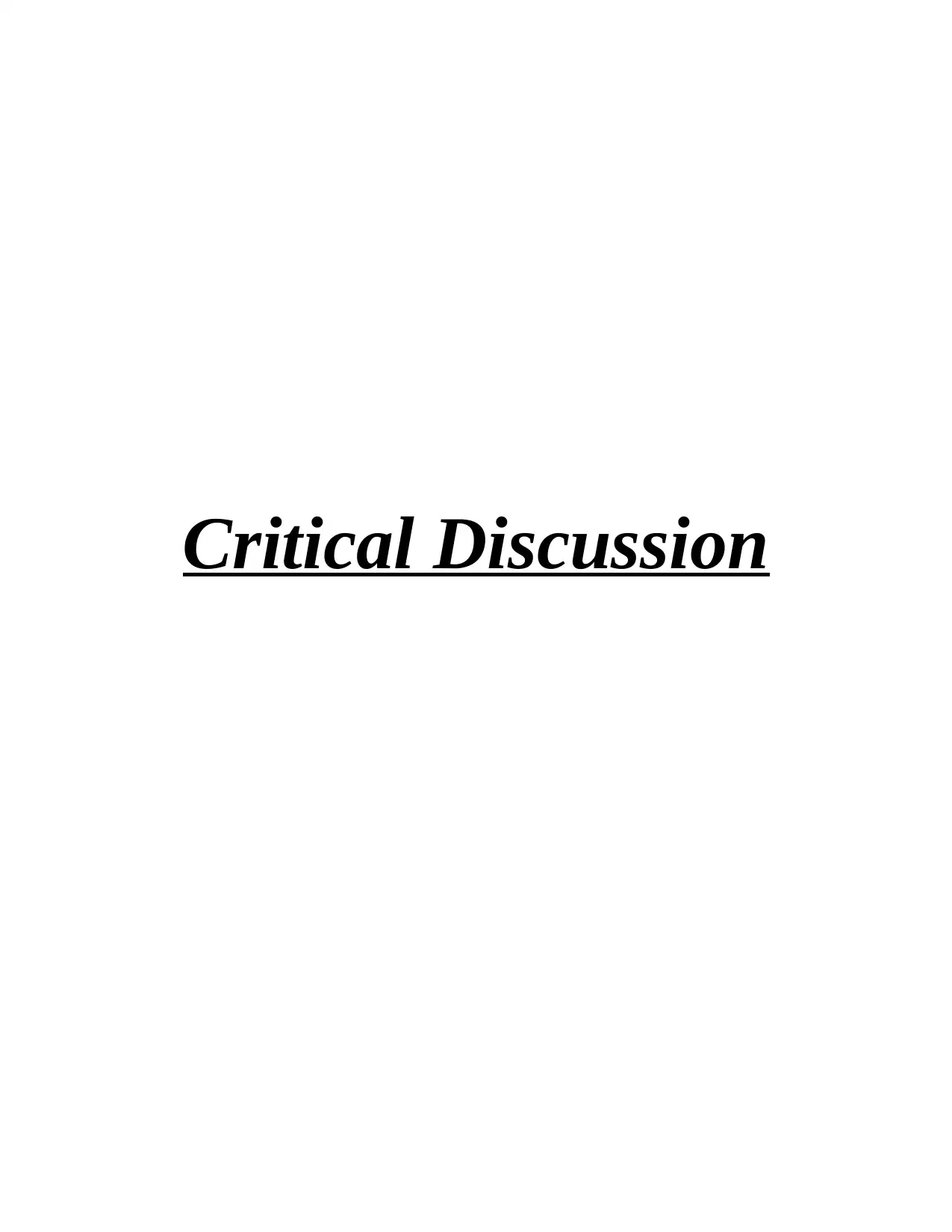
Critical Discussion
Paraphrase This Document
Need a fresh take? Get an instant paraphrase of this document with our AI Paraphraser
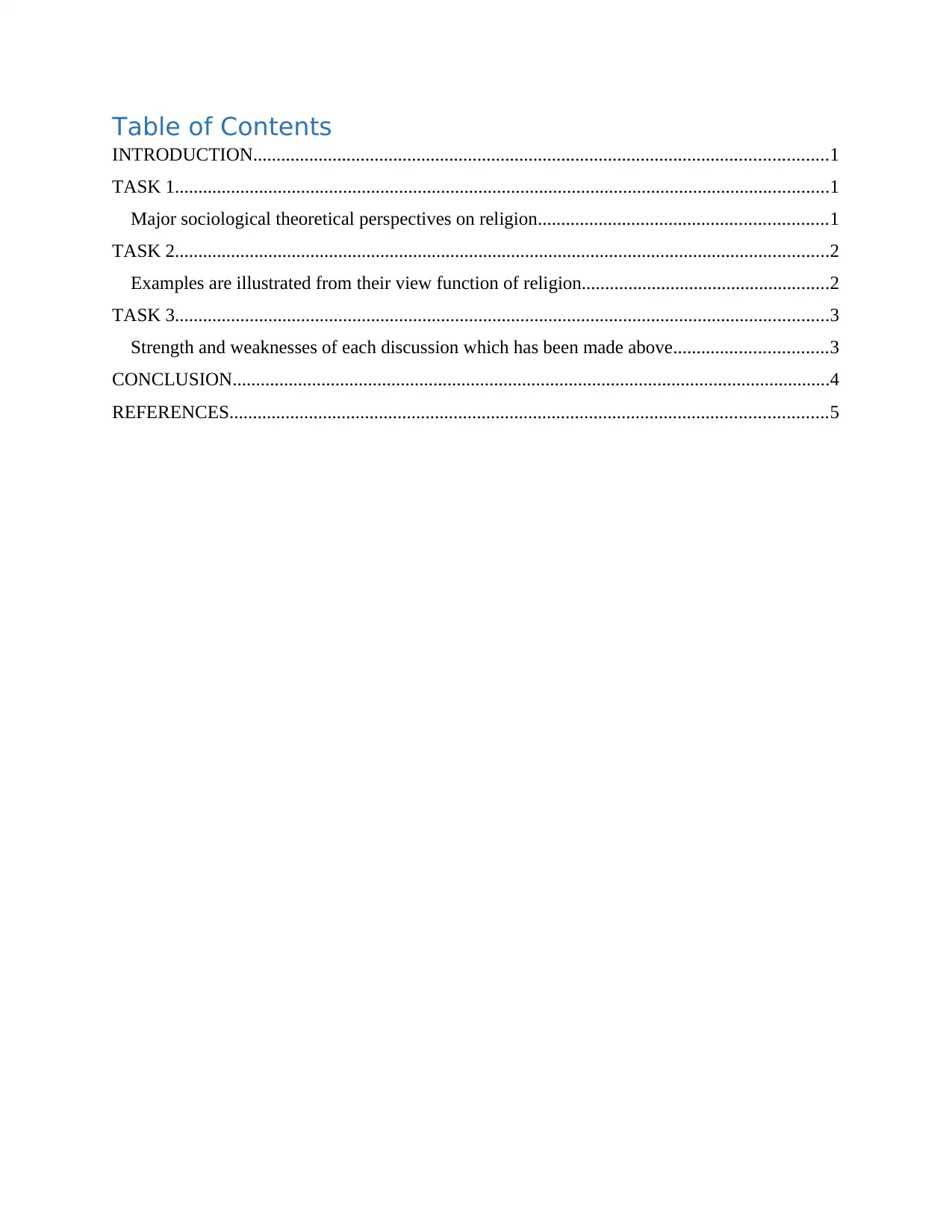
Table of Contents
INTRODUCTION...........................................................................................................................1
TASK 1............................................................................................................................................1
Major sociological theoretical perspectives on religion..............................................................1
TASK 2............................................................................................................................................2
Examples are illustrated from their view function of religion.....................................................2
TASK 3............................................................................................................................................3
Strength and weaknesses of each discussion which has been made above.................................3
CONCLUSION................................................................................................................................4
REFERENCES................................................................................................................................5
INTRODUCTION...........................................................................................................................1
TASK 1............................................................................................................................................1
Major sociological theoretical perspectives on religion..............................................................1
TASK 2............................................................................................................................................2
Examples are illustrated from their view function of religion.....................................................2
TASK 3............................................................................................................................................3
Strength and weaknesses of each discussion which has been made above.................................3
CONCLUSION................................................................................................................................4
REFERENCES................................................................................................................................5
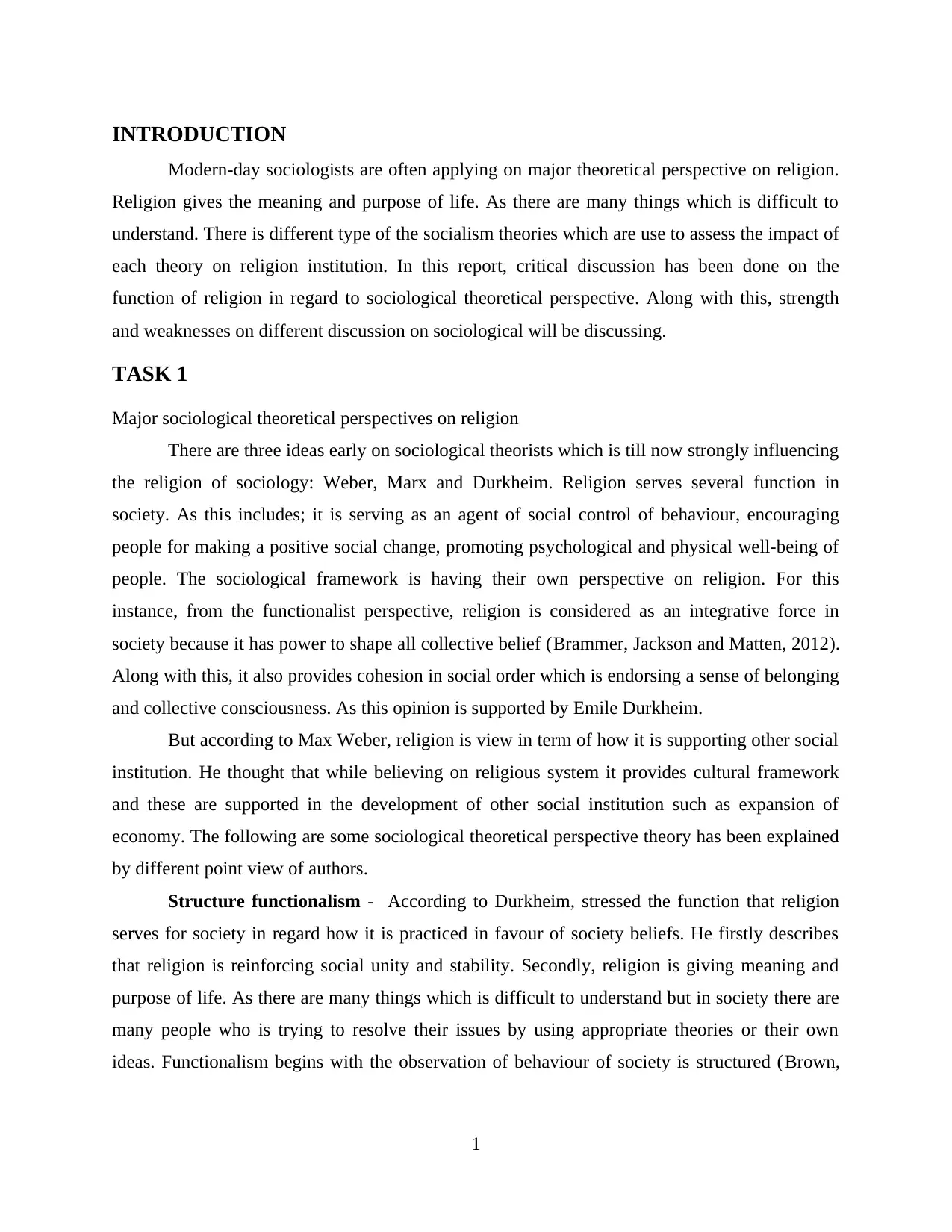
INTRODUCTION
Modern-day sociologists are often applying on major theoretical perspective on religion.
Religion gives the meaning and purpose of life. As there are many things which is difficult to
understand. There is different type of the socialism theories which are use to assess the impact of
each theory on religion institution. In this report, critical discussion has been done on the
function of religion in regard to sociological theoretical perspective. Along with this, strength
and weaknesses on different discussion on sociological will be discussing.
TASK 1
Major sociological theoretical perspectives on religion
There are three ideas early on sociological theorists which is till now strongly influencing
the religion of sociology: Weber, Marx and Durkheim. Religion serves several function in
society. As this includes; it is serving as an agent of social control of behaviour, encouraging
people for making a positive social change, promoting psychological and physical well-being of
people. The sociological framework is having their own perspective on religion. For this
instance, from the functionalist perspective, religion is considered as an integrative force in
society because it has power to shape all collective belief (Brammer, Jackson and Matten, 2012).
Along with this, it also provides cohesion in social order which is endorsing a sense of belonging
and collective consciousness. As this opinion is supported by Emile Durkheim.
But according to Max Weber, religion is view in term of how it is supporting other social
institution. He thought that while believing on religious system it provides cultural framework
and these are supported in the development of other social institution such as expansion of
economy. The following are some sociological theoretical perspective theory has been explained
by different point view of authors.
Structure functionalism - According to Durkheim, stressed the function that religion
serves for society in regard how it is practiced in favour of society beliefs. He firstly describes
that religion is reinforcing social unity and stability. Secondly, religion is giving meaning and
purpose of life. As there are many things which is difficult to understand but in society there are
many people who is trying to resolve their issues by using appropriate theories or their own
ideas. Functionalism begins with the observation of behaviour of society is structured (Brown,
1
Modern-day sociologists are often applying on major theoretical perspective on religion.
Religion gives the meaning and purpose of life. As there are many things which is difficult to
understand. There is different type of the socialism theories which are use to assess the impact of
each theory on religion institution. In this report, critical discussion has been done on the
function of religion in regard to sociological theoretical perspective. Along with this, strength
and weaknesses on different discussion on sociological will be discussing.
TASK 1
Major sociological theoretical perspectives on religion
There are three ideas early on sociological theorists which is till now strongly influencing
the religion of sociology: Weber, Marx and Durkheim. Religion serves several function in
society. As this includes; it is serving as an agent of social control of behaviour, encouraging
people for making a positive social change, promoting psychological and physical well-being of
people. The sociological framework is having their own perspective on religion. For this
instance, from the functionalist perspective, religion is considered as an integrative force in
society because it has power to shape all collective belief (Brammer, Jackson and Matten, 2012).
Along with this, it also provides cohesion in social order which is endorsing a sense of belonging
and collective consciousness. As this opinion is supported by Emile Durkheim.
But according to Max Weber, religion is view in term of how it is supporting other social
institution. He thought that while believing on religious system it provides cultural framework
and these are supported in the development of other social institution such as expansion of
economy. The following are some sociological theoretical perspective theory has been explained
by different point view of authors.
Structure functionalism - According to Durkheim, stressed the function that religion
serves for society in regard how it is practiced in favour of society beliefs. He firstly describes
that religion is reinforcing social unity and stability. Secondly, religion is giving meaning and
purpose of life. As there are many things which is difficult to understand but in society there are
many people who is trying to resolve their issues by using appropriate theories or their own
ideas. Functionalism begins with the observation of behaviour of society is structured (Brown,
1
⊘ This is a preview!⊘
Do you want full access?
Subscribe today to unlock all pages.

Trusted by 1+ million students worldwide
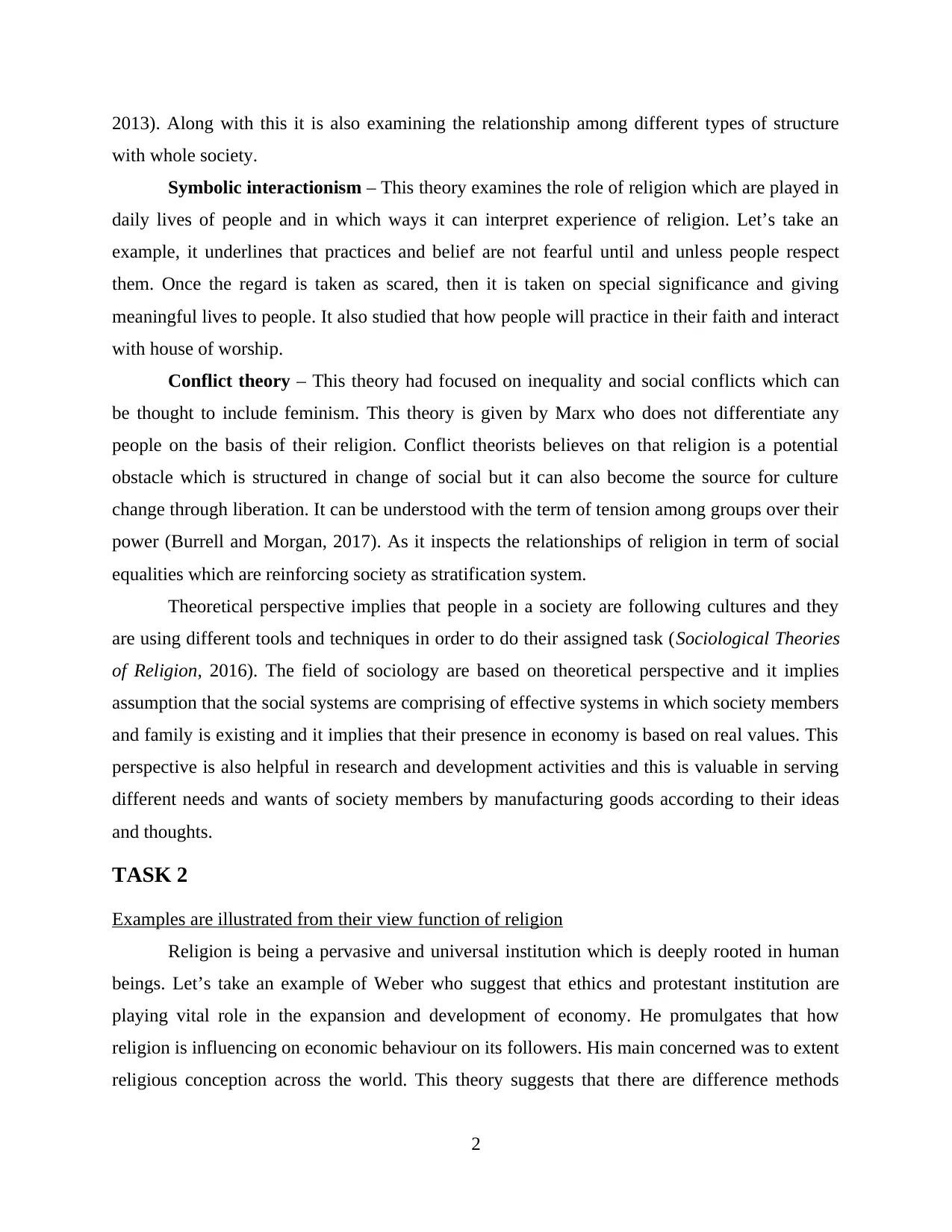
2013). Along with this it is also examining the relationship among different types of structure
with whole society.
Symbolic interactionism – This theory examines the role of religion which are played in
daily lives of people and in which ways it can interpret experience of religion. Let’s take an
example, it underlines that practices and belief are not fearful until and unless people respect
them. Once the regard is taken as scared, then it is taken on special significance and giving
meaningful lives to people. It also studied that how people will practice in their faith and interact
with house of worship.
Conflict theory – This theory had focused on inequality and social conflicts which can
be thought to include feminism. This theory is given by Marx who does not differentiate any
people on the basis of their religion. Conflict theorists believes on that religion is a potential
obstacle which is structured in change of social but it can also become the source for culture
change through liberation. It can be understood with the term of tension among groups over their
power (Burrell and Morgan, 2017). As it inspects the relationships of religion in term of social
equalities which are reinforcing society as stratification system.
Theoretical perspective implies that people in a society are following cultures and they
are using different tools and techniques in order to do their assigned task (Sociological Theories
of Religion, 2016). The field of sociology are based on theoretical perspective and it implies
assumption that the social systems are comprising of effective systems in which society members
and family is existing and it implies that their presence in economy is based on real values. This
perspective is also helpful in research and development activities and this is valuable in serving
different needs and wants of society members by manufacturing goods according to their ideas
and thoughts.
TASK 2
Examples are illustrated from their view function of religion
Religion is being a pervasive and universal institution which is deeply rooted in human
beings. Let’s take an example of Weber who suggest that ethics and protestant institution are
playing vital role in the expansion and development of economy. He promulgates that how
religion is influencing on economic behaviour on its followers. His main concerned was to extent
religious conception across the world. This theory suggests that there are difference methods
2
with whole society.
Symbolic interactionism – This theory examines the role of religion which are played in
daily lives of people and in which ways it can interpret experience of religion. Let’s take an
example, it underlines that practices and belief are not fearful until and unless people respect
them. Once the regard is taken as scared, then it is taken on special significance and giving
meaningful lives to people. It also studied that how people will practice in their faith and interact
with house of worship.
Conflict theory – This theory had focused on inequality and social conflicts which can
be thought to include feminism. This theory is given by Marx who does not differentiate any
people on the basis of their religion. Conflict theorists believes on that religion is a potential
obstacle which is structured in change of social but it can also become the source for culture
change through liberation. It can be understood with the term of tension among groups over their
power (Burrell and Morgan, 2017). As it inspects the relationships of religion in term of social
equalities which are reinforcing society as stratification system.
Theoretical perspective implies that people in a society are following cultures and they
are using different tools and techniques in order to do their assigned task (Sociological Theories
of Religion, 2016). The field of sociology are based on theoretical perspective and it implies
assumption that the social systems are comprising of effective systems in which society members
and family is existing and it implies that their presence in economy is based on real values. This
perspective is also helpful in research and development activities and this is valuable in serving
different needs and wants of society members by manufacturing goods according to their ideas
and thoughts.
TASK 2
Examples are illustrated from their view function of religion
Religion is being a pervasive and universal institution which is deeply rooted in human
beings. Let’s take an example of Weber who suggest that ethics and protestant institution are
playing vital role in the expansion and development of economy. He promulgates that how
religion is influencing on economic behaviour on its followers. His main concerned was to extent
religious conception across the world. This theory suggests that there are difference methods
2
Paraphrase This Document
Need a fresh take? Get an instant paraphrase of this document with our AI Paraphraser
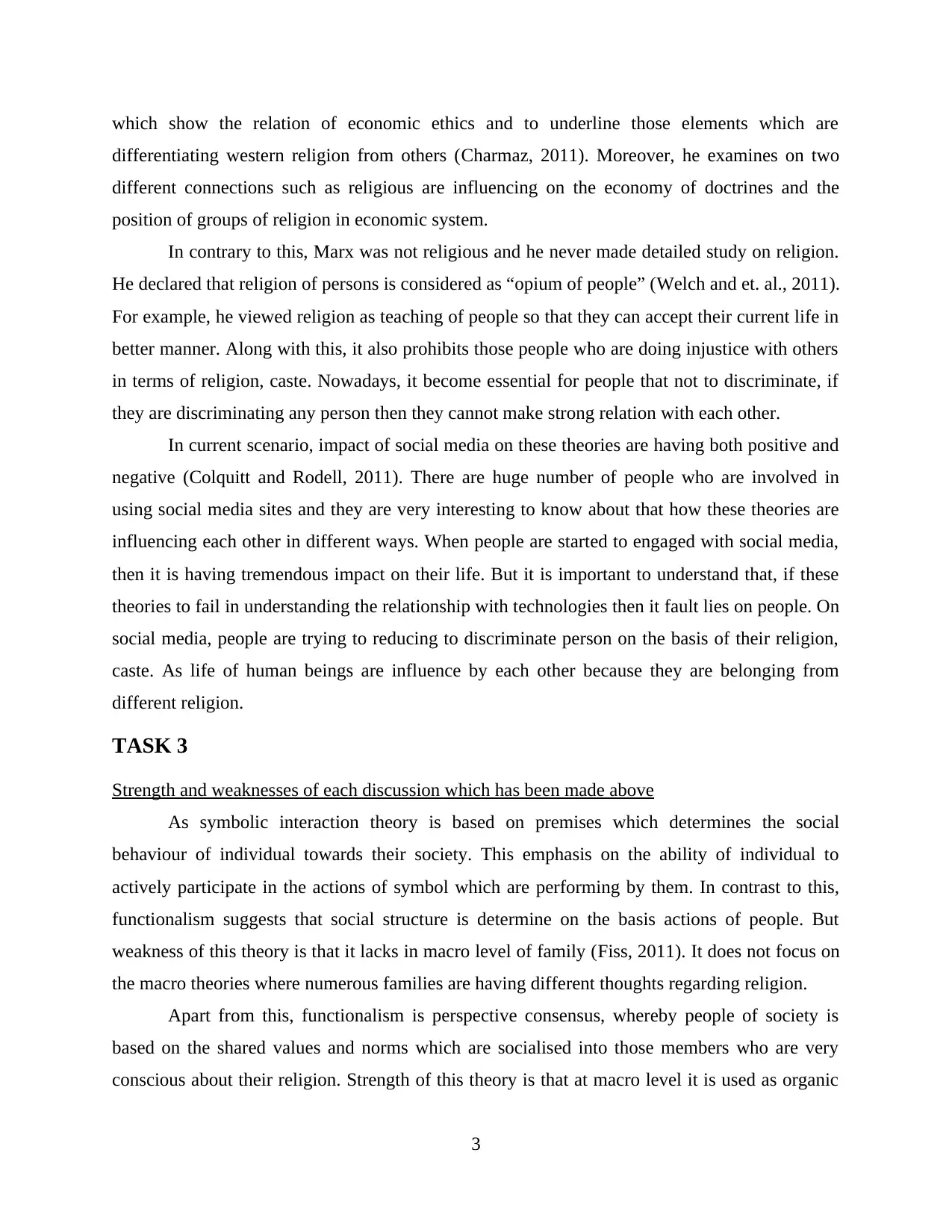
which show the relation of economic ethics and to underline those elements which are
differentiating western religion from others (Charmaz, 2011). Moreover, he examines on two
different connections such as religious are influencing on the economy of doctrines and the
position of groups of religion in economic system.
In contrary to this, Marx was not religious and he never made detailed study on religion.
He declared that religion of persons is considered as “opium of people” (Welch and et. al., 2011).
For example, he viewed religion as teaching of people so that they can accept their current life in
better manner. Along with this, it also prohibits those people who are doing injustice with others
in terms of religion, caste. Nowadays, it become essential for people that not to discriminate, if
they are discriminating any person then they cannot make strong relation with each other.
In current scenario, impact of social media on these theories are having both positive and
negative (Colquitt and Rodell, 2011). There are huge number of people who are involved in
using social media sites and they are very interesting to know about that how these theories are
influencing each other in different ways. When people are started to engaged with social media,
then it is having tremendous impact on their life. But it is important to understand that, if these
theories to fail in understanding the relationship with technologies then it fault lies on people. On
social media, people are trying to reducing to discriminate person on the basis of their religion,
caste. As life of human beings are influence by each other because they are belonging from
different religion.
TASK 3
Strength and weaknesses of each discussion which has been made above
As symbolic interaction theory is based on premises which determines the social
behaviour of individual towards their society. This emphasis on the ability of individual to
actively participate in the actions of symbol which are performing by them. In contrast to this,
functionalism suggests that social structure is determine on the basis actions of people. But
weakness of this theory is that it lacks in macro level of family (Fiss, 2011). It does not focus on
the macro theories where numerous families are having different thoughts regarding religion.
Apart from this, functionalism is perspective consensus, whereby people of society is
based on the shared values and norms which are socialised into those members who are very
conscious about their religion. Strength of this theory is that at macro level it is used as organic
3
differentiating western religion from others (Charmaz, 2011). Moreover, he examines on two
different connections such as religious are influencing on the economy of doctrines and the
position of groups of religion in economic system.
In contrary to this, Marx was not religious and he never made detailed study on religion.
He declared that religion of persons is considered as “opium of people” (Welch and et. al., 2011).
For example, he viewed religion as teaching of people so that they can accept their current life in
better manner. Along with this, it also prohibits those people who are doing injustice with others
in terms of religion, caste. Nowadays, it become essential for people that not to discriminate, if
they are discriminating any person then they cannot make strong relation with each other.
In current scenario, impact of social media on these theories are having both positive and
negative (Colquitt and Rodell, 2011). There are huge number of people who are involved in
using social media sites and they are very interesting to know about that how these theories are
influencing each other in different ways. When people are started to engaged with social media,
then it is having tremendous impact on their life. But it is important to understand that, if these
theories to fail in understanding the relationship with technologies then it fault lies on people. On
social media, people are trying to reducing to discriminate person on the basis of their religion,
caste. As life of human beings are influence by each other because they are belonging from
different religion.
TASK 3
Strength and weaknesses of each discussion which has been made above
As symbolic interaction theory is based on premises which determines the social
behaviour of individual towards their society. This emphasis on the ability of individual to
actively participate in the actions of symbol which are performing by them. In contrast to this,
functionalism suggests that social structure is determine on the basis actions of people. But
weakness of this theory is that it lacks in macro level of family (Fiss, 2011). It does not focus on
the macro theories where numerous families are having different thoughts regarding religion.
Apart from this, functionalism is perspective consensus, whereby people of society is
based on the shared values and norms which are socialised into those members who are very
conscious about their religion. Strength of this theory is that at macro level it is used as organic
3
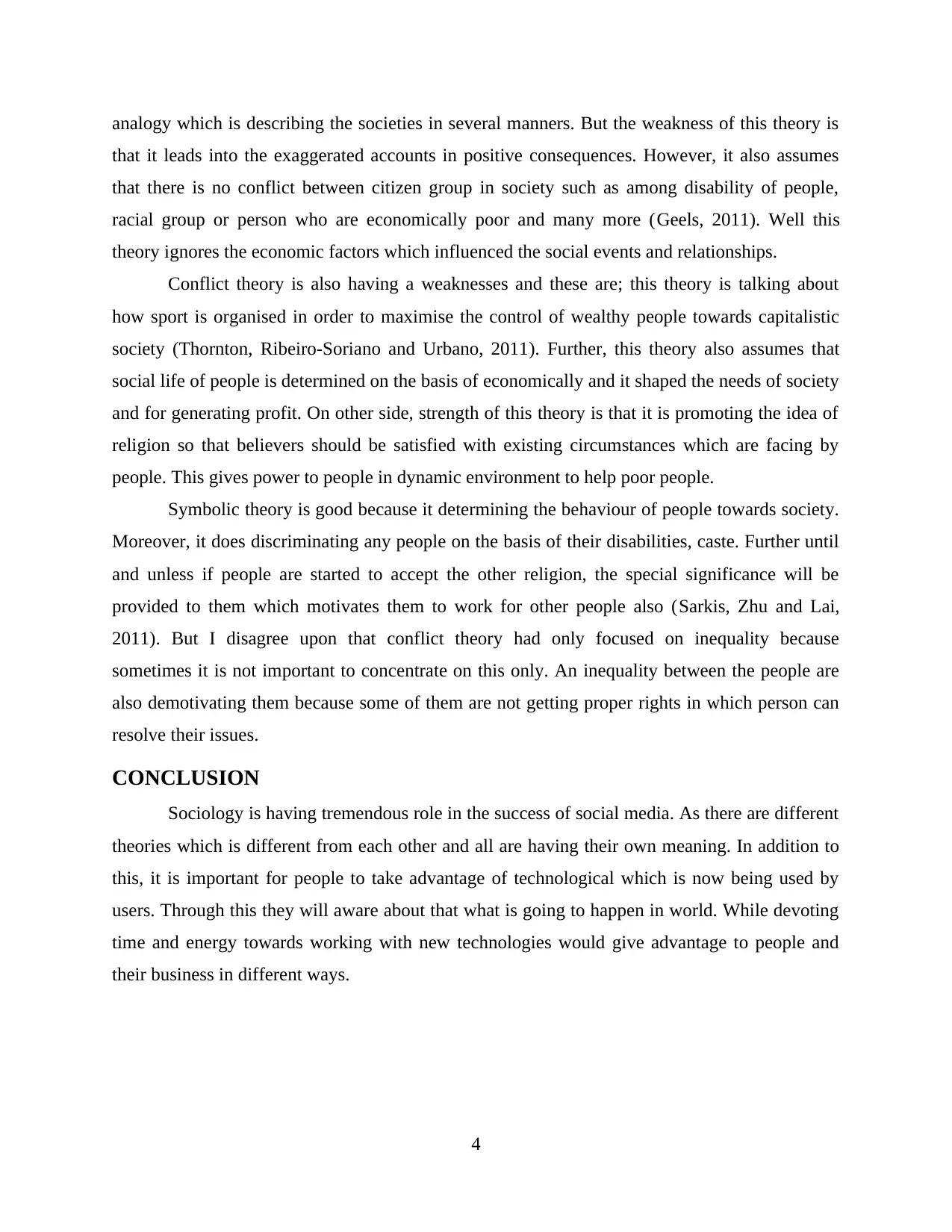
analogy which is describing the societies in several manners. But the weakness of this theory is
that it leads into the exaggerated accounts in positive consequences. However, it also assumes
that there is no conflict between citizen group in society such as among disability of people,
racial group or person who are economically poor and many more (Geels, 2011). Well this
theory ignores the economic factors which influenced the social events and relationships.
Conflict theory is also having a weaknesses and these are; this theory is talking about
how sport is organised in order to maximise the control of wealthy people towards capitalistic
society (Thornton, Ribeiro-Soriano and Urbano, 2011). Further, this theory also assumes that
social life of people is determined on the basis of economically and it shaped the needs of society
and for generating profit. On other side, strength of this theory is that it is promoting the idea of
religion so that believers should be satisfied with existing circumstances which are facing by
people. This gives power to people in dynamic environment to help poor people.
Symbolic theory is good because it determining the behaviour of people towards society.
Moreover, it does discriminating any people on the basis of their disabilities, caste. Further until
and unless if people are started to accept the other religion, the special significance will be
provided to them which motivates them to work for other people also (Sarkis, Zhu and Lai,
2011). But I disagree upon that conflict theory had only focused on inequality because
sometimes it is not important to concentrate on this only. An inequality between the people are
also demotivating them because some of them are not getting proper rights in which person can
resolve their issues.
CONCLUSION
Sociology is having tremendous role in the success of social media. As there are different
theories which is different from each other and all are having their own meaning. In addition to
this, it is important for people to take advantage of technological which is now being used by
users. Through this they will aware about that what is going to happen in world. While devoting
time and energy towards working with new technologies would give advantage to people and
their business in different ways.
4
that it leads into the exaggerated accounts in positive consequences. However, it also assumes
that there is no conflict between citizen group in society such as among disability of people,
racial group or person who are economically poor and many more (Geels, 2011). Well this
theory ignores the economic factors which influenced the social events and relationships.
Conflict theory is also having a weaknesses and these are; this theory is talking about
how sport is organised in order to maximise the control of wealthy people towards capitalistic
society (Thornton, Ribeiro-Soriano and Urbano, 2011). Further, this theory also assumes that
social life of people is determined on the basis of economically and it shaped the needs of society
and for generating profit. On other side, strength of this theory is that it is promoting the idea of
religion so that believers should be satisfied with existing circumstances which are facing by
people. This gives power to people in dynamic environment to help poor people.
Symbolic theory is good because it determining the behaviour of people towards society.
Moreover, it does discriminating any people on the basis of their disabilities, caste. Further until
and unless if people are started to accept the other religion, the special significance will be
provided to them which motivates them to work for other people also (Sarkis, Zhu and Lai,
2011). But I disagree upon that conflict theory had only focused on inequality because
sometimes it is not important to concentrate on this only. An inequality between the people are
also demotivating them because some of them are not getting proper rights in which person can
resolve their issues.
CONCLUSION
Sociology is having tremendous role in the success of social media. As there are different
theories which is different from each other and all are having their own meaning. In addition to
this, it is important for people to take advantage of technological which is now being used by
users. Through this they will aware about that what is going to happen in world. While devoting
time and energy towards working with new technologies would give advantage to people and
their business in different ways.
4
⊘ This is a preview!⊘
Do you want full access?
Subscribe today to unlock all pages.

Trusted by 1+ million students worldwide
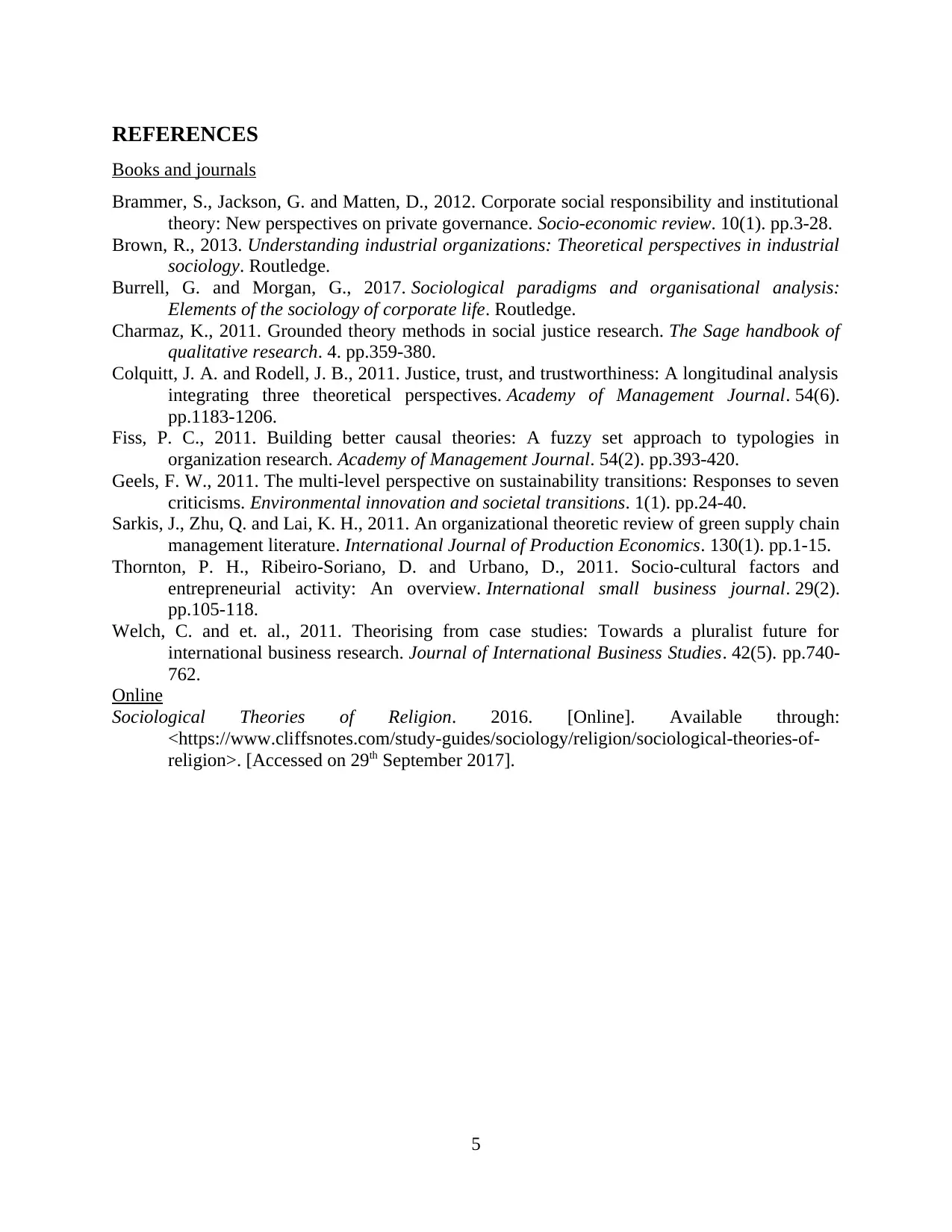
REFERENCES
Books and journals
Brammer, S., Jackson, G. and Matten, D., 2012. Corporate social responsibility and institutional
theory: New perspectives on private governance. Socio-economic review. 10(1). pp.3-28.
Brown, R., 2013. Understanding industrial organizations: Theoretical perspectives in industrial
sociology. Routledge.
Burrell, G. and Morgan, G., 2017. Sociological paradigms and organisational analysis:
Elements of the sociology of corporate life. Routledge.
Charmaz, K., 2011. Grounded theory methods in social justice research. The Sage handbook of
qualitative research. 4. pp.359-380.
Colquitt, J. A. and Rodell, J. B., 2011. Justice, trust, and trustworthiness: A longitudinal analysis
integrating three theoretical perspectives. Academy of Management Journal. 54(6).
pp.1183-1206.
Fiss, P. C., 2011. Building better causal theories: A fuzzy set approach to typologies in
organization research. Academy of Management Journal. 54(2). pp.393-420.
Geels, F. W., 2011. The multi-level perspective on sustainability transitions: Responses to seven
criticisms. Environmental innovation and societal transitions. 1(1). pp.24-40.
Sarkis, J., Zhu, Q. and Lai, K. H., 2011. An organizational theoretic review of green supply chain
management literature. International Journal of Production Economics. 130(1). pp.1-15.
Thornton, P. H., Ribeiro-Soriano, D. and Urbano, D., 2011. Socio-cultural factors and
entrepreneurial activity: An overview. International small business journal. 29(2).
pp.105-118.
Welch, C. and et. al., 2011. Theorising from case studies: Towards a pluralist future for
international business research. Journal of International Business Studies. 42(5). pp.740-
762.
Online
Sociological Theories of Religion. 2016. [Online]. Available through:
<https://www.cliffsnotes.com/study-guides/sociology/religion/sociological-theories-of-
religion>. [Accessed on 29th September 2017].
5
Books and journals
Brammer, S., Jackson, G. and Matten, D., 2012. Corporate social responsibility and institutional
theory: New perspectives on private governance. Socio-economic review. 10(1). pp.3-28.
Brown, R., 2013. Understanding industrial organizations: Theoretical perspectives in industrial
sociology. Routledge.
Burrell, G. and Morgan, G., 2017. Sociological paradigms and organisational analysis:
Elements of the sociology of corporate life. Routledge.
Charmaz, K., 2011. Grounded theory methods in social justice research. The Sage handbook of
qualitative research. 4. pp.359-380.
Colquitt, J. A. and Rodell, J. B., 2011. Justice, trust, and trustworthiness: A longitudinal analysis
integrating three theoretical perspectives. Academy of Management Journal. 54(6).
pp.1183-1206.
Fiss, P. C., 2011. Building better causal theories: A fuzzy set approach to typologies in
organization research. Academy of Management Journal. 54(2). pp.393-420.
Geels, F. W., 2011. The multi-level perspective on sustainability transitions: Responses to seven
criticisms. Environmental innovation and societal transitions. 1(1). pp.24-40.
Sarkis, J., Zhu, Q. and Lai, K. H., 2011. An organizational theoretic review of green supply chain
management literature. International Journal of Production Economics. 130(1). pp.1-15.
Thornton, P. H., Ribeiro-Soriano, D. and Urbano, D., 2011. Socio-cultural factors and
entrepreneurial activity: An overview. International small business journal. 29(2).
pp.105-118.
Welch, C. and et. al., 2011. Theorising from case studies: Towards a pluralist future for
international business research. Journal of International Business Studies. 42(5). pp.740-
762.
Online
Sociological Theories of Religion. 2016. [Online]. Available through:
<https://www.cliffsnotes.com/study-guides/sociology/religion/sociological-theories-of-
religion>. [Accessed on 29th September 2017].
5
1 out of 7
Related Documents
Your All-in-One AI-Powered Toolkit for Academic Success.
+13062052269
info@desklib.com
Available 24*7 on WhatsApp / Email
![[object Object]](/_next/static/media/star-bottom.7253800d.svg)
Unlock your academic potential
Copyright © 2020–2026 A2Z Services. All Rights Reserved. Developed and managed by ZUCOL.




